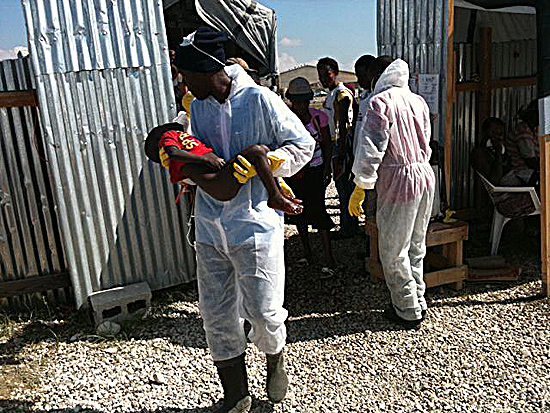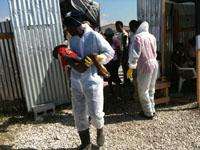The cholera epidemic continues, stabilizing in some areas while worsening in others.

Haiti 2010 © Aurelie Baumel / MSF
A young cholera patient is brought into an MSF facility in Port-au-Prince to receive treatment.
Since October 22, 2010, Doctors Without Borders/Médecins Sans Frontières (MSF) has treated 62,000 people with cholera symptoms in Haiti. This week, MSF's 4,000 Haitian staff and 315 international employees treated close to 2,000 patients each day in the 47 centers and cholera treatment units it has established across the country.
MSF has treated more than 15,000 people in the capital with cholera symptoms since the epidemic began. The number of patients admitted into MSF facilities in Port-au-Prince has stabilized at a daily average of 385 patients this week. The situation is also stabilizing in the Artibonite department, which has thus far been hardest hit by the epidemic and where more than 23,000 people have been treated. This week, slightly more than 1,000 people were admitted into MSF facilities there.
However, the epidemic continues to spread in Haiti's northern cities and rural areas. During the past week, more than 4,000 patients were treated in the Department du Nord, as its known locally, and 1,100 patients were treated in the Department du Nord Ouest. Despite the significant logistical challenges involved in reaching isolated parts of both departments, MSF teams are expanding the number of units, treatment centers, and rehydration points in both areas.
Meanwhile, the epidemic has increased sharply in the South. Of the 475 people treated in the South for cholera since the start of the outbreak, 439 presented in the past seven days. In Jacmel, in the Departement du Sud Est, approximately 100 patients are arriving at MSF's 50-bed cholera treatment unit every day. "Our team had to handle an inflow of 260 in a single day," says Dr. Loreto Barcelo, MSF's coordinator in Jacmel. "There were people everywhere… Patients, their families… There were several hundred people at the treatment site. We had to put up to four patients in a single bed and try to save as many as possible while waiting for extra help to arrive. We now have an additional 20 nurses helping us and opened a new 100-bed treatment center, which is helping us manage the situation."
This week, new cholera treatment facilities were set up in Pignon, St Raphaël, Ranquitte (Nord), Gaspard (Nord Ouest), and Jérémie (Grande Anse). However, as the epidemic continues to spread, the response by local and international organizations remains inadequate.
Some have raised the possibility of launching a vaccination campaign. Under the circumstances, epidemiologist Kate Alberti wonders if this is appropriate. "The epidemic affects the entire country today, including the most remote areas. This isn't the time to carry out a vaccination campaign. The priority is to treat patients, provide access to chlorinated water and improve hygiene measures to prevent others from becoming ill." However, Alberti adds, "In the future, we will consider vaccination as a viable option to immunize the population and limit the appearance of a new epidemic."




